Spencer Fullerton Baird of the Smithsonian Institution writes to Richard Henry Pratt offering to transfer Tichkematse to Carlisle, and extends his support for Pratt's efforts at Carlisle in Congress.
Congressional Lobbying
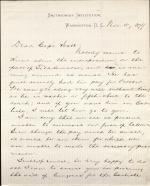
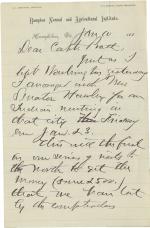
Samuel Chapman Armstrong of the Hampton Institute writes to Richard Henry Pratt informing him of a potential meeting between Armstrong and Senator Hawley to discuss money owed to Hampton by the government.
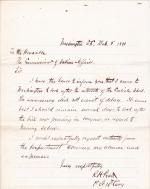
Richard Henry Pratt writes to the Commissioner of Indian Affairs, stating that he is in Washington on an emergency trip to look after the best interests of the school. Pratt notes that the Congressional bill about the founding of the school is currently under debate, and requests permission to continue staying in Washington.
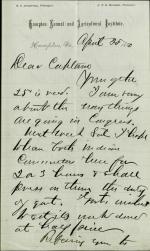
Samuel Chapman Armstrong of the Hampton Institute writes to Richard Henry Pratt sympathizing with Pratt's ongoing issues to gain political support for adequate funding for Indian education. Armstrong also criticizes the need for philanthropic funding, saying "referring you to private charity is shameful and disgusting."
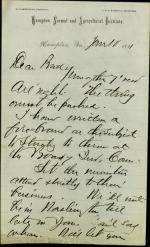
Samuel Chapman Armstrong of the Hampton Institute writes to Richard Henry Pratt discussing political lobbying issues with the Board of Indian Commissioners, likely over per capita funding concerns. Armstrong notes a planned lobbying trip to Washington.
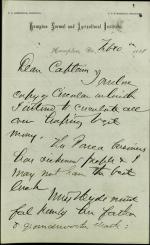
Samuel Chapman Armstrong of the Hampton Institute writes to Richard Henry Pratt enclosing a soon-to-be-distributed circular (missing from the file), and discussing both the Ponca party of visitors and Armstrong's hopes to take a delegation of students to Washington.
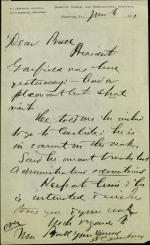
Samuel Chapman Armstrong of the Hampton Institute writes to Richard Henry Pratt sharing details of President James Garfield's visit to Hampton. Armstrong also informs Pratt of his desire to exhibit at a manufacturers' exhibition in Boston and requests that Pratt send him some of his industrial arts materials for the exhibit.
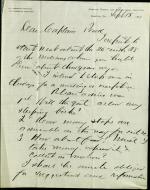
Samuel Chapman Armstrong of the Hampton Institute writes to Richard Henry Pratt asking for expense details for the return home of former Ft. Marion prisoners educated at Hampton over a three-year period. Armstrong also notes that the recovery of President James A. Garfield from an assassination attempt will be a benefit for them as they seek…
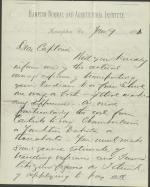
Samuel Chapman Armstrong of the Hampton Institute writes to Richard Henry Pratt to get an estimate of student travel expenses from Carlisle to the West. Armstrong also complains of financial limitations recently placed by Congress, and offers support for any of Pratt's efforts to advocate with the Indian Department.
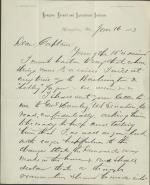
Samuel Chapman Armstrong of the Hampton Institute writes to Richard Henry Pratt discussing his willingness to lobby for both Hampton and Carlisle.
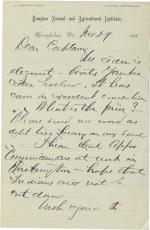
Samuel Chapman Armstrong of the Hampton Institute writes to Richard Henry Pratt praising the cider he recently received, asking for its price, and discussing the work of the Affairs Committee in Congress in Washington.
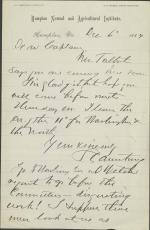
Samuel Chapman Armstrong of the Hampton Institute writes to Richard Henry Pratt discussing the timing of a possible visit of Pratt to Hampton, to work with Armstrong's upcoming travel plans to Washington and the North. Armstrong notes that his Washington trip is meant to deal with a recent report to go in front of a Congressional committee.
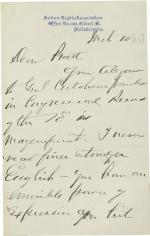
Samuel Chapman Armstrong of the Hampton Institute, writing on Indian Rights Association letterhead, writes to Richard Henry Pratt acknowledging that his recent telegram has been printed in the Congressional Record, and praising his work.
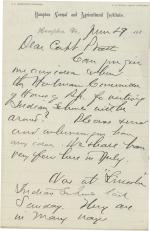
Samuel Chapman Armstrong of the Hampton Institute writes to Richard Henry Pratt asking if he knows when Representative Holman and his committee intended to visit Indian schools. Armstrong also shares his views from a recent visit to the Lincoln Indian School in Philadelphia.
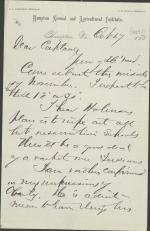
Samuel Chapman Armstrong of the Hampton Institute writes to Richard Henry Pratt discussing his professional network, including news on a plan to eliminate boarding schools in favor of reservation schools and a trip to Philadelphia.
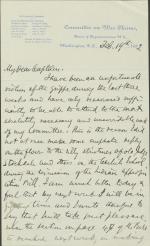
U.S. Representative Frank E. Beltzhoover writes to Richard Henry Pratt discussing the Indian Appropriations Bill currently being debated in Congress, and asking for information to help his support of additional funding for the Carlisle Indian School.
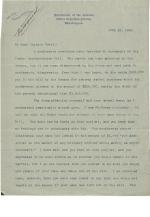
Robert V. Belt, Assistant Commissioner of the Department of the Interior's Office of Indian Affairs, writes to Richard Henry Pratt discussing the current status of the Indian Appropriations Bill, and funds allotted to supplement Pratt's military income while serving as superintendent at Carlisle. Belt urges Pratt to reconsider his threat to…
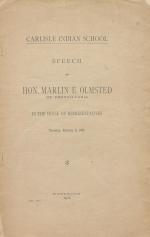
Pennsylvania Representative Marlin Olmstead delivers this speech on the Carlisle Indian School in the House of Representative on February 6, 1908.
